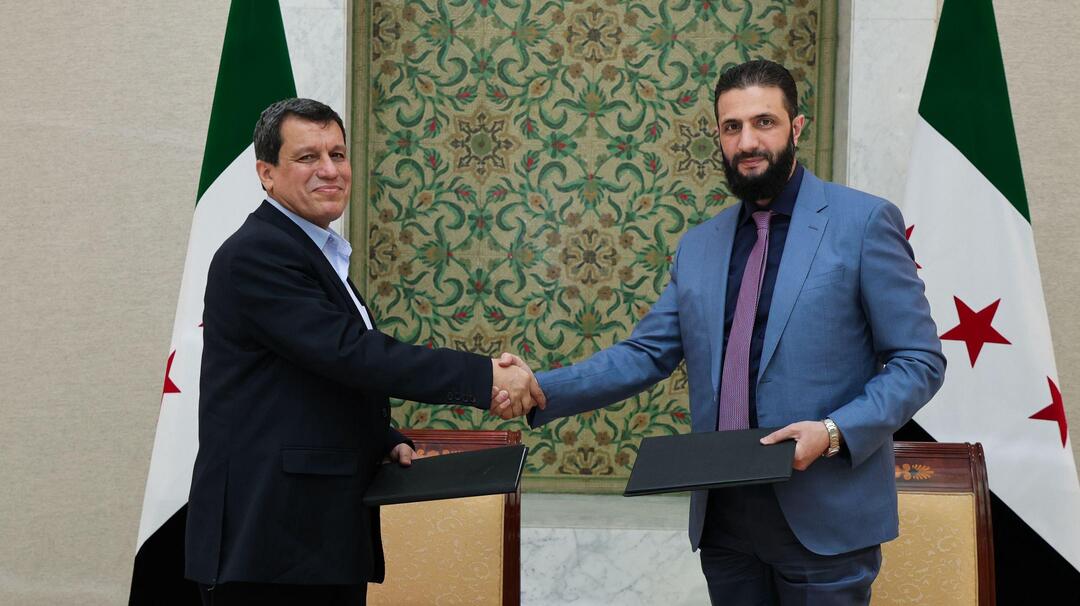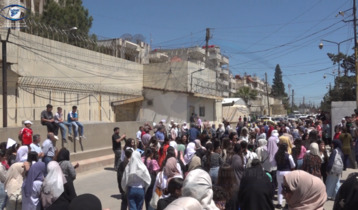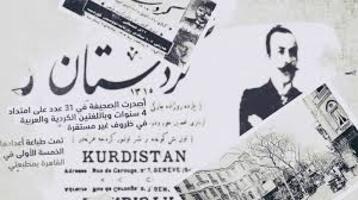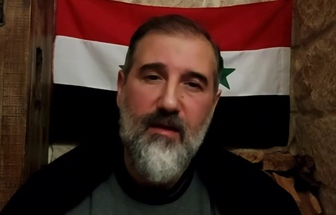-
The Syrian Kurdistan Front's concerns about the Sharaa-Abdi agreement

The Kurdish Front in Syria views with suspicion the agreement signed on March 10, 2025, between the newly appointed Syrian administration leader Ahmad al-Shara and the Commander of the Syrian Democratic Forces (SDF) Mazloum Abdi. Therefore, we have deemed it necessary to clarify the points of agreement and disagreement we have, considering the latter as significant risks.
There is no doubt that we support the fight against the remnants of the previous regime, as mentioned in Article 6 of the aforementioned agreement, but we completely reject any targeting of civilian Alawites. We also fully support Article 3 of the agreement, which calls for a ceasefire across all Syrian territories. Furthermore, we endorse Article 5, which ensures the return of all displaced Syrians to their towns and villages while guaranteeing their protection from the Syrian state. Last but not least, we see Article 2 as a first step towards achieving equality regarding the constitutional rights of Kurds.
However, there are many points of disagreement in this agreement. It does not in any way meet the demands of the Kurdish Front in Syria concerning power-sharing and decentralization; rather, it seeks to have Damascus control all authorities. Likewise, Article 4, which states that “all civilian and military institutions in Northeast Syria will be integrated into the Syrian state administration, including border crossings, airports, and oil and gas fields,” leaves no room for Kurdish administration, neither at the administrative nor political level.
Another important point is that under this agreement, Kurds are not recognized as a nationality, nor is there any provision granting the Kurdish language official status in Syria or even allowing its use as an administrative language in Kurdish areas. Additionally, the agreement does not mention any commitment to establish a fair educational system that guarantees Kurds the opportunity to learn their mother tongue alongside Arabic.
Another point of concern is Article 1 of the agreement, which states, “ensuring the rights of all Syrians in representation and participation in the political process and all state institutions based on competence, regardless of their religious and ethnic backgrounds.” This may initially seem to propose a principle of equality, but in reality, we see it as a systematic exclusion of Kurds, especially since it ignores the long-standing history of systematic marginalization of infrastructure and education in Kurdish regions during Baath rule, which has hindered the development of Kurdish generations. Kurds, who were stripped of their citizenship in the 1960s and lived for decades as “stateless,” were denied higher education and access to many professions, making competition for government jobs “based on competence” unfair. Furthermore, the refusal to recognize Kurdish identity may lead to the prohibition of Kurdish parties in the future, thereby preventing Kurdish representation in the upcoming parliament and government. This concern is compounded by the previous lack of invitations extended to representatives of Kurdish parties to attend and participate in what was referred to as the Syrian National Dialogue Conference, limiting invitations to independent Kurdish figures who only represent themselves.
We also support Article 7 of the agreement, which states, “rejecting calls for division, hate speech, and attempts to sow discord among all components of Syrian society,” but we reject the use of such phrases as a pretext to suppress freedom of expression and restrict open political discussions. Consequently, what defines the term “calls for division”? Do they mean that calls for a decentralized or federative Syria are calls for secession or division? Is defending this considered an attempt to sow discord?
Aside from the issues of the rights of components in Syria, this agreement does not include any clear commitment to achieving gender equality or taking measures to support women and combat historical discrimination against them.
We reiterate that Mazloum Abdi's signing of this agreement as a military leader is unacceptable, as political decisions should be made by politicians, not military personnel. We stress that this agreement undermines all efforts aimed at unifying the Kurdish ranks and forming a joint Kurdish delegation to Damascus to negotiate Kurdish rights.
This agreement, in its current form, merely reinforces absolute centralization and reproduces exclusionary and discriminatory policies, hindering the direction of Syria toward a unified, democratic, and pluralistic state, where true equality among all components can be achieved.
You May Also Like
Popular Posts
Caricature
BENEFIT Sponsors BuildHer...
- April 23, 2025
BENEFIT, the Kingdom’s innovator and leading company in Fintech and electronic financial transactions service, has sponsored the BuildHer CityHack 2025 Hackathon, a two-day event spearheaded by the College of Engineering and Technology at the Royal University for Women (RUW).
Aimed at secondary school students, the event brought together a distinguished group of academic professionals and technology experts to mentor and inspire young participants.
More than 100 high school students from across the Kingdom of Bahrain took part in the hackathon, which featured an intensive programme of training workshops and hands-on sessions. These activities were tailored to enhance participants’ critical thinking, collaborative problem-solving, and team-building capabilities, while also encouraging the development of practical and sustainable solutions to contemporary challenges using modern technological tools.
BENEFIT’s Chief Executive Mr. Abdulwahed AlJanahi, commented: “Our support for this educational hackathon reflects our long-term strategic vision to nurture the talents of emerging national youth and empower the next generation of accomplished female leaders in technology. By fostering creativity and innovation, we aim to contribute meaningfully to Bahrain’s comprehensive development goals and align with the aspirations outlined in the Kingdom’s Vision 2030—an ambition in which BENEFIT plays a central role.”
Professor Riyadh Yousif Hamzah, President of the Royal University for Women, commented: “This initiative reflects our commitment to advancing women in STEM fields. We're cultivating a generation of creative, solution-driven female leaders who will drive national development. Our partnership with BENEFIT exemplifies the powerful synergy between academia and private sector in supporting educational innovation.”
Hanan Abdulla Hasan, Senior Manager, PR & Communication at BENEFIT, said: “We are honoured to collaborate with RUW in supporting this remarkable technology-focused event. It highlights our commitment to social responsibility, and our ongoing efforts to enhance the digital and innovation capabilities of young Bahraini women and foster their ability to harness technological tools in the service of a smarter, more sustainable future.”
For his part, Dr. Humam ElAgha, Acting Dean of the College of Engineering and Technology at the University, said: “BuildHer CityHack 2025 embodies our hands-on approach to education. By tackling real-world problems through creative thinking and sustainable solutions, we're preparing women to thrive in the knowledge economy – a cornerstone of the University's vision.”
opinion
Report
ads
Newsletter
Subscribe to our mailing list to get the new updates!






















